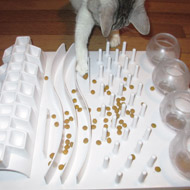
Experts review existing evidence
Obesity, aggression and fear in cats can all be improved by the introduction of food puzzles, according to new research.
Originally developed to provide enrichment for captive zoo and laboratory animals, food puzzles take advantage of cats’ natural instincts to work for their food.
Writing in the Journal of Feline Medicine and Surgery, a team of US vets and behaviourists review the existing evidence on food puzzles and explain how to introduce them to cats.
“Current guidelines for the care and welfare of domestic cats suggest that they be allowed to express the predatory sequence to the extent possible, including active acquisition of food,” they write.
The effect of food puzzles on cats is a relatively new area of study, but their provision has been shown to increase activity and reduce problematic behaviour in dogs.
“In cats, various forms of enrichment (such as play, perches, play towers and novel toys) have been shown to reduce signs of stress and to contribute to weight loss,” they add.
In the study, the authors collated data of over 30 cases from their own practices where food puzzles were introduced to aid with a specific health or behavioural concern.
Examples include an obese eight-year-old cat who lost 20 per cent of his bodyweight within 12 months of puzzle implementation and a two-year-old domestic shorthair whose fear of people significantly improved following the addition of both mobile and stationary food puzzles.
The researchers say that cats are likely to have individual preferences for the the type of food puzzle or how they react to them. Some may prefer puzzles that can be pushed or rolled, while others may prefer using stationary puzzles.
“Ultimately, because implementing food puzzles offers enrichment beyond just as a means of providing food, the end goal is to have several different types of puzzles available for cats (as is recommended with other toys),” the researchers explain.
“The key to success is for clients to introduce puzzles to the cats correctly. This means setting the difficulty level to meet the abilities of the cat, and increasing the cat’s motivation to interact with the puzzle as much as possible.”
For a checklist of pointers for choosing a starter puzzle and guidance on how to implement them, visit http://jfm.sagepub.com/content/18/9/723.full.pdf+html.
Image (C) International Society of Feline Medicine



 The Veterinary Medicines Directorate (VMD) is inviting applications from veterinary students to attend a one-week extramural studies (EMS) placement in July 2026.
The Veterinary Medicines Directorate (VMD) is inviting applications from veterinary students to attend a one-week extramural studies (EMS) placement in July 2026.